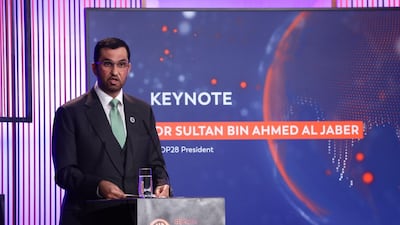The world has a “small window” of opportunity to make a major course correction in the race to limit temperature rises to 1.5°C above pre-industrial levels, as set out in the 2015 Paris Agreement, Cop28 President-designate Dr Sultan Al Jaber has said.
The international community must collectively act immediately to ensure the energy transition is swift and leaves no countries behind, he said on Wednesday during a speech at the Berlin Energy Transition Dialogue conference.
“The world is losing the race to keep temperatures from rising 1.5°C above pre-industrial levels,” Dr Al Jaber said, referring to the latest Intergovernmental Panel on Climate Change report issued last week.
“We have a small window of opportunity to make a massive course correction. There is still time but we must act now and we must act together, and we must anchor our response with a rapid, well managed and just energy transition.”
The UAE will host the next UN Cop28 climate summit from November 30 to December 12.
The meeting of heads of state, finance and business leaders, and members of civil society, will take stock of what has been achieved since the Paris Agreement of 2015.
Global investments in energy transition technology must quadruple to $35 trillion by 2030 to stay in line with commitments made under the Paris climate agreement, according to a report by the International Renewable Energy Agency (Irena).
Investments in renewable energy technology reached a record of $1.3 trillion last year but that figure must rise to about $5 trillion annually to meet the key Paris accord target of limiting temperature increases to 1.5ºC above pre-industrial levels, the Abu Dhabi-based agency said in its World Energy Transitions Outlook 2023 preview.
Dr Al Jaber, who is also UAE Minister of Industry and Advanced Technology, emphasised that in delivering the energy transition, developing countries must have adequate access to renewable energy and cheaper funding.
“We need to ensure that no one is left behind. Last year, developing economies received only 20 per cent of clean tech investments. These are economies that represent 70 per cent of the world's population, that is over five billion people, and 800 million of them have no access to energy at all,” Dr Al Jaber said.
“They must have access to the least carbon-intensive options available today as we all stay focused on building the energy system of tomorrow. And, of course, a critical success factor here is finance.”
He called for holistic reforms across the global financial architecture and the transformation of multilateral development banks to ensure developing economies are not left behind as the world pursues clean energy solutions.
“These institutions were established almost 80 years ago to solve postwar inequity and drive reconstruction. We need to modernise their mandate and update their operating models to cater for and adapt to the 21st-century requirements,” Dr Al Jaber said.
Concessional funding needs to be much more available, accessible and affordable to “lower risk and attract private finance at a multiple”, he added.
“If we make the right moves today, we can create a low carbon pathway to a high-growth destination.”
Countries around the world are at different stages in their energy transition progress, so “we cannot adopt a one-size-fits-all” approach and all available options must be explored, he said.
The solution is not just “renewables or hydrogen or nuclear or carbon capture or only using the least carbon-intensive oil and gas — in fact, it is all of the above, plus new technologies yet to be invented. And once invented, commercialised, advanced and then deployed”.
Dr Al Jaber called for global renewable energy capacity to be tripled by 2030 and by six times by 2040 to 50,000 terawatt hours, as the world seeks to reduce emissions by 43 per cent in the next seven years.
“Renewable energy is transforming the power sector ─ providing almost 90 per cent of all new generating capacity last year. We need to build on that growth,” he said.
Dr Al Jaber also underscored the importance of hydrogen as an option to support hard-to-abate sectors such as steel, cement, aluminium and heavy transport.
While the hydrogen value chain is “still very much in its infancy”, the international community needs to turn to proven commercialised technology such as carbon capture to curb emissions, he said.
There are only 44 million tonnes per annum of operational carbon capture globally but that needs to multiply by 30 times to more than 1.28 billion tonnes, he said.
“The main barrier is cost. We need smart, progressive government regulation and subsidies to lower cost and attract private sector investment. We need to explore emerging carbon capture technologies like direct air, mineralisation and osmosis,” Dr Al Jaber said.
“Carbon capture can become a true bridge in the energy transition.”
The energy sector must work closely with other sectors and players — such as heavy emitters, technology companies, the finance community and civil society — on finding “breakthrough solutions” to decarbonising economies at scale.
“Carbon emissions are an industrial-size problem that require an industrial-scale solution,” he said.


